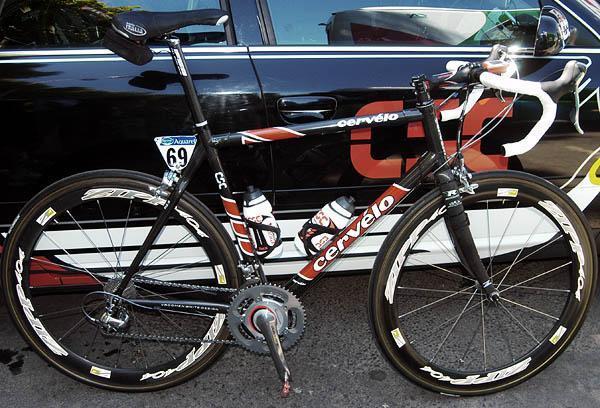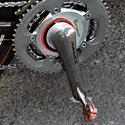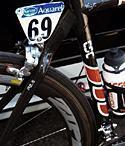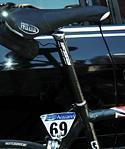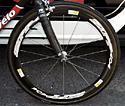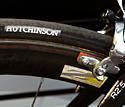
Recently on Cyclingnews.com |
91st Tour de France - July 3-25, 2004
Tour de France tech, July 17, 2004
Jens Voigt's Team CSC Cervélo R2.5
Weight watcherTeam CSC has new Cervélo R2.5s for this year's Tour de France - and they're causing headaches for the team's mechanics. With a substantial chunk of weight trimmed from the frames compared to last year, CSC is having to be careful to keep the bikes above the UCI's 6.8kg weight limit. John Stevenson & Chris Henry wish they had such trouble. CSC has a problem. "It is a bit of a frustrating situation at Team CSC," Gerard Vroomen of the team's bike sponsor Cervélo told Cyclingnews. "There are superlight FSA cranks the team cannot really use, superlight Zipp wheels they cannot really use, and a new superlight Cervélo frame they cannot really use because the bikes are already at the minimum weight. If they were to use all that the bikes would be approximately a pound too light." Such problems we should all have, but CSC's situation is a symptom of the way the UCI's bike weight limit of 6.8kg is making teams scratch their heads over exactly how to equip their bikes, especially for the mountains. The days when you just assembled the lightest bike that would hold together are long gone. The platform for CSC this year is the latest version of Cervélo's R2.5 carbon frame. While it's visually similar to last year's frame, Vroomen and partner Phil White say they've shaved 200g off the frame weight compared to the 2003 version - without compromising quality. "We are fanatical about testing," says White, "as we never want to see a problem develop with one of our frames. So, we take the toughest industry standard, the DIN [German industry standard], and then test our frames to over twice that standard just to make absolutely sure." With the weight loss program, the R2.5 frame is down to under 1000g, depending on size. From there it's not terribly hard to hit the UCI weight limit. "When the team finished building up the bikes most were a few hundred grams too light," says Vroomen, "so those riders ride with heavier wheels. The final weight depends mostly on frame size and saddle choice, those Turbomatics weigh a lot more than an SLR. And that is without using any cheater parts, custom seatpost-saddle combos, prototype frames or anything. Just plain and simple stock frames with stock parts." Vroomen believes that the nw R2.5 " is significantly stronger than almost any other frame available - whether in carbon, aluminum, or steel." And he has good evidence from this year's Tour in the shape of the bike that's been under luckless CSC rider Kurt-Asle Arvesen for the whole race. "Mr. Arvesen seems to be making a point of proving this on an almost daily basis as he runs in to barriers at every possible moment," says Vroomen. "Yet he is still riding the very same bike he started the Tour on." Arvesen's team-mate Jens Voigt hasn't been testing his bike's limits quite that hard, and it's his bike we grabbed for a set of photos before the riders set off for the short hop from St Flour to Figeac on stage 11. The following day, of course, the R2.5's climbing abilities were ably demonstrated as Ivan Basso achieved a breakthrough stage victory at La Mongie, ahead of Lance Armstrong, with team-mate Carlos Sastre not far behind in fifth. Jens is a big guy, and goes for a 58cm R2.5 with 177.5mm cranks and a 140mm stem. But perhaps the most unusual aspect of his setup is the SRM Powermeter, built into a modified Dura-Ace chainset. Time was, SRM Powermeters were de rigueur during early season training, but were swapped out when the racing got serious in favour of lighter regular cranks. But with the leeway afforded by the low weight of everything else, there's wiggle room to use an SRM and still hit 6.8kg. And it's not just any SRM. As well as the obvious custom chainset, Voigt's SRM is hooked up to a wireless transmitter conveying his power readings to a German TV station that's following his progress through the Tour. The necessary electronics lives in the bag under his seat, which is why Jens appears to be the only rider in the Tour carrying a repair kit. Shimano's ten-speed Dura-Ace handles the rest of the transmission and braking duties, with Speedplay's light Zero pedals adding to the CSC bikes' 'weight problem'. Voigt goes for a Selle Italia Turbo-matic saddle atop one of FSA's carbon fiber seatposts, and FSA also comes in with the steering components, providing the headset, OS115 aluminium stem and 7050 aluminium handlebar at a whopping 46cm width. We told you Voigt was a big guy. The long-predicted death of tubulars certainly hasn't hit the Tour peloton this year, and CSC is another team running tubs. It faithful Zipp 404 wheels are shod with Hutchinson tubulars. PhotographyImages by Chris Henry/Cyclingnews
| |||||
|
| ||||

